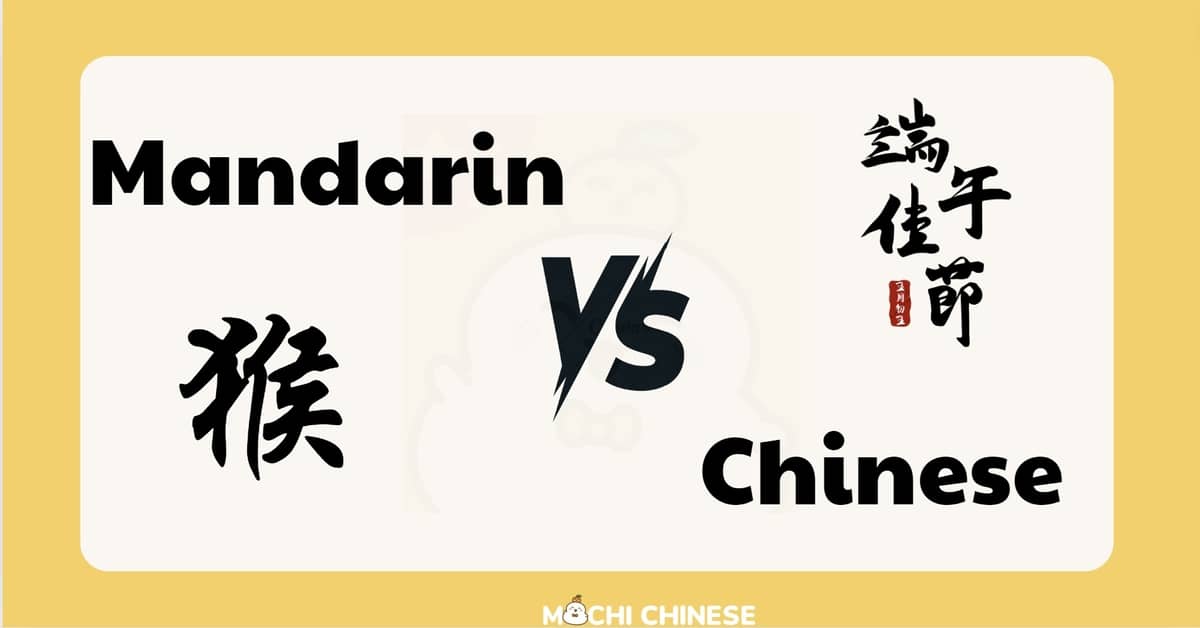In the realm of language learning, the distinction between Mandarin and Chinese can be a perplexing puzzle for many. Understanding these terms is crucial for aspiring linguists, as they open doors to diverse cultures and opportunities. This article unravels the complexities, guiding readers through the maze of Mandarin and other Chinese dialects.

Understanding the Terms
Definition of ‘Chinese’
This term refers to a family of languages spoken by the Han Chinese ethnic group and various other ethnic groups in China. Chinese languages are tonal and predominantly written using Chinese characters. Additionally, within the broader category of “Chinese,” there are numerous dialects, each with its own unique characteristics and regional variations.
The most prominent Chinese language is Mandarin, which serves as the official language of China and Taiwan, as well as one of the official languages of Singapore. Mandarin is based on the Beijing dialect and is the most widely spoken Chinese language, with hundreds of millions of speakers. Other major Chinese languages include Cantonese, spoken primarily in the Guangdong province and Hong Kong, and Hokkien, spoken in parts of Fujian province and Taiwan.
Definition of ‘Mandarin’
Mandarin, also known as Standard Chinese or Putonghua, is the official language of China and Taiwan. It is also one of the official languages of Singapore and is recognized as one of the six official languages of the United Nations. Mandarin is based on the Beijing dialect and is used as the standard form of communication in education, media, and official government affairs throughout China.
Mandarin is based on the Beijing dialect and is characterized by its use of four main tones, which convey different meanings. It is a tonal language, meaning that the pitch or tone in which a syllable is pronounced can change its meaning. Mandarin is written using Chinese characters, which are logograms that represent words or morphemes rather than phonetic sounds.
The Differences Between Mandarin and Other Chinese Languages
Linguistic Differences
- Phonetics: Mandarin has its own distinct phonetic system characterized by four main tones, which differentiate the meaning of words. Other Chinese languages, such as Cantonese or Shanghainese, may have different tone systems with more tones or different tonal contours.
- Vocabulary: While Mandarin serves as the standard form of Chinese, regional languages and dialects often have unique vocabulary items or expressions not found in Mandarin. Conversely, Mandarin may have adopted loanwords or expressions from other languages/dialects due to cultural exchanges.
- Grammar: While Mandarin grammar serves as a basis for many Chinese languages, there are often grammatical differences between Mandarin and other dialects. For instance, word order, sentence structure, and grammatical particles may vary.
Cultural and Regional Variations
- Cultural Identity: Language is closely tied to cultural identity, and different Chinese languages/dialects are associated with specific regions and ethnic groups. Speaking a particular dialect may signify belonging to a certain community or region.
- Regionalism: Certain Chinese languages/dialects are strongly associated with specific regions within China or other Chinese-speaking communities worldwide. For example, Cantonese is primarily spoken in Guangdong province and Hong Kong, while Hokkien is prevalent in Fujian province and Taiwan.
| Factor | Mandarin | Cantonese |
|---|---|---|
| Factors | Mandarin | Cantonese |
| Phonetics | Four tones and one neutral tone | Six to nine tones |
| Vocabulary | Standardized vocabulary | Classical Chinese vocabulary and has unique regional terms. |
| Written | Simplified character | Traditional system character and unique written Cantonese |
| Regionalism | Mainland China, Taiwan and Singapore | Hong Kong and Guangdong province |
Why Learn Mandarin?
Practical Reasons
Mandarin is the most spoken language in the world, with over a billion native speakers. Its significance in global affairs, international business, and diplomacy is continually growing, making it a valuable asset for professionals.
Besides, China is a major economic powerhouse. Proficiency in Mandarin can open doors to career opportunities in various sectors, including finance, trade, technology, and manufacturing. Companies with ties to China often seek employees who can communicate effectively in Mandarin.
Mandarin is essential for conducting business in China and Taiwan. Understanding the language can facilitate smoother interactions, negotiations, and collaborations. Additionally, Mandarin proficiency enhances travel experiences, allowing for deeper engagement with local cultures and communities.
Cultural Benefits
Access to Rich Heritage: Mandarin provides a gateway to a vast and rich cultural heritage, including classical and contemporary Chinese literature, philosophy, and historical texts. Understanding Mandarin allows for a deeper appreciation of these works in their original language.
Cinema and Media: China has a thriving film and media industry. Proficiency in Mandarin enables learners to enjoy Chinese movies, television shows, music, and other forms of entertainment without the need for translations or subtitles, offering an authentic cultural experience.
Cultural Nuances and Social Contexts: Language is deeply intertwined with culture. Learning Mandarin helps learners understand Chinese customs, traditions, and social norms. It enhances cultural sensitivity and the ability to navigate various social contexts within Chinese-speaking communities.
Situations Favoring Learning Other Chinese Dialects
Personal or Family Reasons
Cultural Heritage: If you have family roots in regions where other Chinese dialects are spoken, such as Cantonese in Guangdong or Hokkien in Fujian, learning these dialects can help you connect with your heritage and communicate with older family members who may not speak Mandarin fluently.
Family Communication: In families where a specific dialect is spoken at home, learning that dialect can improve communication and strengthen familial bonds. It allows you to participate fully in family conversations and cultural practices.
Regional Business Necessities
Business in Specific Regions: If you are working or planning to do business in areas where a particular dialect is predominant, such as Cantonese in Hong Kong or Shanghainese in Shanghai, learning the local dialect can enhance your business relationships and facilitate smoother interactions with local partners and clients.
Local Markets: Engaging with local markets and understanding consumer behavior can be more effective when you speak the local dialect. This is particularly relevant for industries like marketing, retail, and hospitality, where local language skills can give you a competitive edge.
How to Decide Which to Learn
Assessing Your Goals and Interests
If your career involves international business, diplomacy, or working with Chinese-speaking communities, Mandarin is the most practical choice due to its widespread use and official status. For careers focused on specific regions, such as Hong Kong (Cantonese) or Shanghai (Shanghainese), learning the local dialect may be more beneficial.
If you have Chinese ancestry, learning the dialect spoken by your ancestors can help you connect with your heritage and communicate with family members who speak that dialect.
Today, Mandarin has the most comprehensive range of learning materials, including textbooks, online courses, language apps, and tutors. Other dialects may have fewer resources available, so it’s important to consider the accessibility of quality learning materials. Besides, you can look for language exchange groups, cultural associations, or community centers where you can practice speaking.
Practical Tips for Beginners
Motivation: Reflect on what motivates you to learn the language. Strong personal motivation can sustain your efforts through the challenges of language learning.
Time Investment: Learning any language requires a significant time investment. Consider how much time you can realistically dedicate to studying and practicing the language. Mandarin, being the most common, might offer more frequent practice opportunities compared to other dialects.
Language Classes and Tutors: Enroll in classes or find a tutor who specializes in the dialect you wish to learn. Personalized instruction can accelerate your learning and provide insights into cultural nuances.
Use Technology: Leverage language learning apps, online courses, and virtual language exchange platforms to practice regularly. Many apps offer dialect-specific courses or lessons that can help you get started. For example, you can use the Mochi Chinese app.
Mochi Chinese is a Chinese vocabulary learning application that uses the Spaced Repetition method to help learners find the golden time to review, effectively memorizing 1000 vocabulary words in 1 month. Based on your learning history, the app arranges learned vocabulary into 5 levels of memorization from not yet remembered to very remembered. From there, allocating time and frequency helps you review the right words at the right time, saving time and effort.
Besides, the app’s vocabulary is up to nearly 5,000 words to help you comfortably build your vocabulary. Vocabulary in the app appears in the form of flashcards with integrated illustrations, pinyin, audio, and example sentences to help you deeply understand the meaning, pronunciation, and context of word usage.
Conclusion
Learning a new language is a transformative experience that opens doors to new cultures, perspectives, and opportunities. Whether you choose to learn Mandarin or another Chinese dialect, each path offers unique rewards and challenges. By aligning your language learning journey with your personal and professional goals, you can make the most of the enriching experience of exploring the Chinese linguistic landscape. Embrace the journey with curiosity and dedication, and you’ll find that learning a new language is not just about communication but also about connecting with a rich tapestry of cultural and historical traditions.




